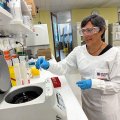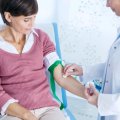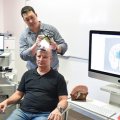ThermoTouch, a portable device for diagnosing the severity of whiplash developed by University of Queensland (UQ) Faculty of Health Sciences researchers, is one of more than 25 cutting-edge medical innovations that UQ's main university research commercialisation company, UniQuest, will be promoting at the 2011 Medica conference, Europe's largest medical technology industry meeting.
Held in Dusseldorf, Germany, from November 16-19, this year's event is expected to attract almost 140,000 participants.
Other new technologies featured in UniQuest's "medtech" portfolio include drug delivery and formulation mechanisms; monitoring, diagnostics and screening systems; clinical practice management and training tools; and allied health and assistive technologies to help patients recover from stroke, injury and the side-effects of disease treatments. See full list.
"Medica is the world's largest medical innovation trade fair, so it's the ideal place for showcasing technologies emerging from Australian university research that are addressing global health issues, such as access, aging populations and preventable diseases," said UniQuest Managing Director, David Henderson.
"With about half the delegates from European Union countries and the remainder from Asia, the Americas and Africa, Medica presents a valuable opportunity for UniQuest to talk to major international companies about the competitive edge to be gained from licensing our technologies, and about collaborating with Australian researchers to improve health outcomes around the world.
"Medica also attracts investors looking to be involved with the next blockbuster medical innovation, and the comparative strength of the national economy has positioned Australia within their sights. UQ medical innovations, for example, are now generating annual sales of more than A$3 billion globally, from vaccines like Gardasil to high-tech MRI machines and telehealth systems, so there's a lot interest in what the research institutions we represent are working on right now to benefit future generations."
UniQuest's medical technology portfolio includes innovations from UQ and its commercialisation partners: University of Wollongong, Mater Medical Research Institute, James Cook University, University of Technology Sydney, University of Tasmania, and Queensland Health.
UniQuest has helped to launch several Australian university medical innovations on to the global market since 1984 including:
>Magnetica Limited, a UniQuest start-up originating from UQ's Centre for Magnetic Resonance (CMR, now the Centre for Advanced Imaging) and the Biomedical Engineering Group within the School of IT and Electrical Engineering, has raised more than $10 million from investors and $2 million in government grants to date. Its designs are now manufactured by Japan Superconductor Technology, Inc. (Jastec), a subsidiary of multinational Kobe Steel, and include a prototype large, very high-field, whole-body magnet and a smaller 1.5T extremity magnet, which is being sold by GE globally.
>UniQuest was involved with the early commercialisation of the HPV technology discovered by Dr Ian Frazer and his late research partner Dr Jian Zhou, which has contributed to the development of a vaccine for cervical cancer. Pharmaceutical company Merck has distributed 65 million doses of Gardasil® since the vaccine's global launch in 2006. It is now approved for use in 123 countries.
>In August this year, UniQuest start-up Vaxxas Pty Ltd received a $15 million investment from a syndicate of Australian and international venture capital funds to develop the Nanopatch vaccine delivery technology, representing one of Australia's largest first round start-up investments.
>UniQuest bio-pharmaceutical start-up QRxPharma Limited listed on the Australian Securities Exchange (ASX) in May 2007 and made history as Australia's biggest biotechnology float. QRxPharma recently announced its successful completion of Phase 3 trials of its patented, pain-management product.
>Another UniQuest start-up, ImpediMed Ltd, closed oversubscribed when it listed on the ASX and as a publicly listed company in September 2007. It recently became the first company to offer FDA, CE and TGA cleared L-Dex devices for simple point-of-care, standardised and objective metrics to aid in the clinical assessment of lymphoedema.
>Spinifex Pharmaceuticals Pty Limited recently secured A$6.3 million in the final tranche of an A$18.3 million series B round to fund clinical efficacy trials of its innovative neuropathic (nerve) pain therapy. The Phase II trial will begin with post-herpetic neuralgia patients, while further trials in peripheral nerve injury patients and cancer chemotherapy patients are expected to start by the end of the year. UniQuest established Spinifex in 2005 with a pre-seed investment from Uniseed, and the start-up company has since raised A$22.3 million to develop a market-ready product.
These ventures and other UniQuest start-ups are among the 1000+ Australian biotechnology and medical technology enterprises contributing to the industry's global growth. Of the 151 healthcare and biotech companies listed on the Australian Securities Exchange, 27 were capitalised at greater than A$100 million this year.
Media: Leanne Wyvill on +61 7 3365 4037, 0409 767 199 or l.wyvill@uniquest.com.au.
About UniQuest Pty Limited
Established by The University of Queensland in 1984, UniQuest is widely recognised as one of Australia's largest and most successful university commercialisation groups, benchmarking in the top tier of technology transfer worldwide. From an intellectual property portfolio of 1500+ patents, it has created over 60 companies, and since 2000, UniQuest and its start-ups have raised more than $400 million to take university technologies to market. Annual sales of products using UQ technology and licensed by UniQuest are running at $3 billion. UniQuest now commercialises innovations developed at The University of Queensland and its commercialisation partner institutions: the University of Wollongong, University of Technology Sydney, James Cook University, University of Tasmania, Mater Medical Research Institute, and Queensland Health. UniQuest also provides access to an expansive and exclusive network of independent academics to tailor a consulting or project R&D solution to meet the diverse needs of industry and government, facilitating some 500 consulting, expert opinion, testing, and contract research services each year. UniQuest is also a leading Australasian provider of international development assistance recognised for excellence in technical leadership, management and research. Working with agencies such as AusAID, NZAID, the Asian Development Bank and the World Bank, UniQuest has developed and implemented more than 400 projects in 46 countries throughout the Pacific, South-East Asia, the Indian sub-continent and Africa.
.jpg)











